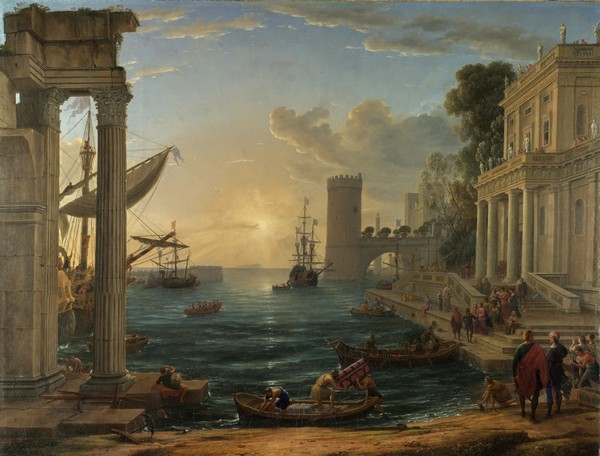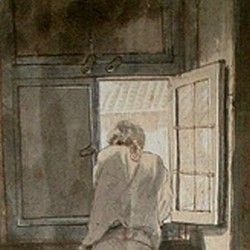
"Ordre et beauté". I haven't gone into Charles Baudelaire's poetry in depth, but these words, "order and beauty," are one of my mottos, as the readers of this blog know; I talked about it a long time ago in a post about L'invitation au voyage by Henri Duparc, composed on a poem by Baudelaire. Back then, I only mentioned in passing the troubled life of the poet and, given that April 9 marks 200 years since he was born, I thought that I could talk about him this week before we listen to one more song, again by Duparc, written on one of his poems.
Charles Baudelaire was born in Paris. His father died when he was six years old and his mother remarried to a military man who imposed at home a severity and puritanism that contributed to make worse his rebellious attitude. A few years later (and a few boarding schools later), the young Charles began to study law and, above all, he began to lead what some people would call a Bohemian life and some other a libertine life. Among the latter was his stepfather, who try to drive him away from that harmful environment. The young man sailed to the Indies; eighteen months later, he returned to Paris having met the East that would inspire the work of so many French artists who haven't set foot there.
He came back, but he didn't mend his ways; he kept leading a bohemian life, this time with more money, because he had reached the age of majority and got his father's inheritance. One and a half years later, half of the inheritance had vanished, and his family decided that his expenses should be approved by an administrator who would give him a monthly allowance; this way, he became de facto a minor. Humiliation didn't help him to fight his alcohol and opium dependence, largely caused by laudanum, a common preparation prescribed by doctors for many pains. In Baudelaire's case, to relieve the symptoms of the syphilis he had contracted before his trip. Baudelaire died in 1867, at the age of fifty-six, his health being terribly damaged by the serious diseases he suffered.
He left, however, a most important work, Les fleurs du mal [The flowers of evil], that strongly influenced the 20th-century poets. The title, a beautiful oxymoron, refers to Baudelaire's intention of telling the beauty that evil (social, moral, physical or metaphysical evil) contains. The book was published in 1857 and soon became an scandal, despite the admiration and support of personalities such as Victor Hugo. Justice condemned both the publisher and the author to pay a heavy fine, while six of the poems were forbidden for gross indecency. In 1861, Baudelaire published a second edition, without the forbidden poems and thirty-two new ones, and eventually prepared a third edition which was published posthumously in 1868. Since then, the book has been continuously republished in French and many translations.
The first of the six books that form Les fleurs du mal is Spleen et idéal. The spleen, a term originated in the 19th century, refers in this case to the melancholy that turns into ennui; the same melancholy that in German culture drives to action, the Sehnsucht, drives to inaction in French culture. The poems in this book reflect the tension between the two concepts, spleen and ideal, and a good example is the twelfth one, La vie antérieure [The former life], in which the poetic voice speaks of a paradise that we easily relate to the verse "luxe, calme et volupté" of L'invitation au voyage (the 53rd poem in Spleen et idéal). Everything seems perfect; senses enjoy the colours, the music and the smell, but in the last verse of the sonnet, suddenly, the spleen appears and prevents the calmness of the spirit.
La vie antérieure is the last song by Henri Duparc, composed in 1884. The composer was only thirty-six years old when he composed it and there was no reason to think that his career would end here, even though he lived fifty more years. He left only seventeen songs and the feeling, when we listen to them (in this case, La vie antérieure performed by Konrad Jarnot and Helmut Deutsch), that the nervous disease that deprived Duparc of creating deprived us of enjoying much beauty.
J’ai longtemps habité sous de vastes portiques
Que les soleils marins teignaient de mille feux,
Et que leurs grands piliers, droits et majestueux,
Rendaient pareils, le soir, aux grottes basaltiques.
Les houles, en roulant les images des cieux,
Mêlaient d’une façon solennelle et mystique
Les tout puissants accords de leur riche musique
Aux couleurs du couchant reflétées par mes yeux …
C’est là que j’ai vécu dans les voluptés calmes
Au milieu de l’azur, des vagues, des splendeurs,
Et des esclaves nus tout imprégnés d’odeurs,
Qui me refraîchissaient le front avec des palmes,
Et dont l’unique soin était d’approfondir
Le secret douloureux qui me faisait languir.



 Peop...
Peop... Imagin...
Imagin... I've cho...
I've cho...











Comments powered by CComment